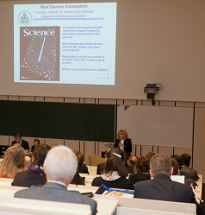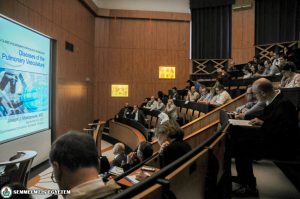Nearly 200 registered participants from 13 countries took part in this year’s Semmelweis Symposium, entitled “Questions of Genomic Medicine: Prediction, Prevention and Personalised Treatment”. In his opening speech, Dr. Ágoston Szél, rector of Semmelweis University, emphasised: the Semmelweis Symposium is one of the University’s most prestigious scientific events, with a tradition stretching back several decades; this year marks the 21st such conference.
Rector Szél recalled that each year a different University professor or researcher is given the opportunity to organise the international conference, which always explores a particularly important and current topic. The high quality of the symposium is guaranteed by the selection process, which is a sort of competition. The potential organisers have to submit an application, including the planned topic and a list of potential invitees. It is based upon these documents that the University’s Scientific Council selects the organiser of the given year’s Semmelweis Symposium.
 The current choice of topic is justified by a constellation of current issues, Dr. Ágoston Szél said. First of all, the “Modern Medical Technologies at Semmelweis University” Research University project officially ended just a few days ago, the preventative module of which focused on personalised medicine. Secondly, 2012 is the Year of Prevention at Semmelweis University.
The current choice of topic is justified by a constellation of current issues, Dr. Ágoston Szél said. First of all, the “Modern Medical Technologies at Semmelweis University” Research University project officially ended just a few days ago, the preventative module of which focused on personalised medicine. Secondly, 2012 is the Year of Prevention at Semmelweis University.
Rector Szél emphasised: The symposium is not only a scientific event, but is very important from an educational point-of-view as well, with Ph.D. student receiving credit points for participating in the conference, under certain conditions.
 With regards to the changing paradigms in personalised medicine, Dr. Mária Judit Molnár, vice-rector for Scientific Affairs and president of the symposium, said the following: The North American region is the most advanced with regards to the clinical application of personalised medicine, but the European Union is not far behind – though there are some technological differences.
With regards to the changing paradigms in personalised medicine, Dr. Mária Judit Molnár, vice-rector for Scientific Affairs and president of the symposium, said the following: The North American region is the most advanced with regards to the clinical application of personalised medicine, but the European Union is not far behind – though there are some technological differences.
Almost every such examination is available in Hungary as well, with the knowledge and techniques at the European-level. These examinations are extensively present in Semmelweis University’s research portfolio, which also focuses on research related to those biomarkers, which support early diagnosis and the identification of genetic risk factors. Semmelweis University is at the forefront of personalised medicine research, Dr. Mária Judit Molnár emphasised.
Pálma Dobozi and Zsuzsa Szuchy
Translated by Gina Varga-Gönczi


